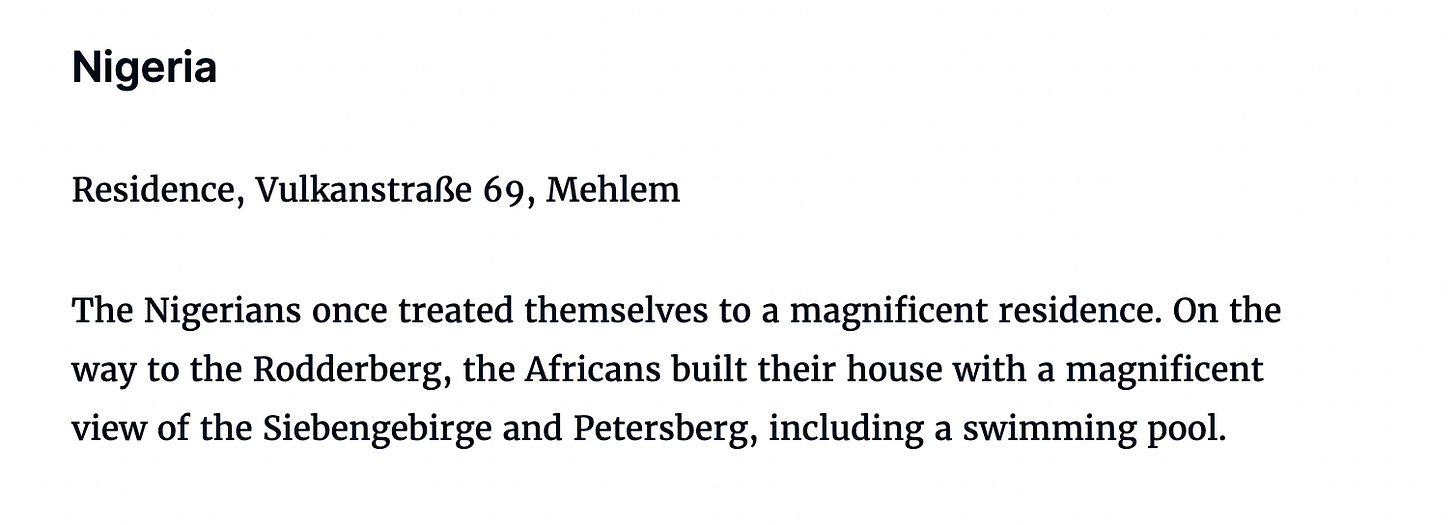Tinubu-Scholz: A new era for Nigeria-Germany relations
The Buhari-Merkel era has now come to an end...
German Chancellor Olaf Scholz arrived Nigeria yesterday, on a two-day visit (October 29 and 30, 2023). He held a bilateral meeting with President Bola Ahmed Tinubu, followed by a Business Roundtable with the German business delegation that accompanied him to Nigeria.
It’s the Chancellor’s third Africa trip since succeeding THE Angela Merkel in 2021— and his first to Nigeria.
This visit effectively marks the end of the Buhari-Merkel era of Nigeria-Germany relations, and the dawning of the Tinubu-Scholz era.
The last visit of a German Chancellor to Nigeria was in August 2018, when Angela Merkel visited and met with President Buhari. That was when the Presidential Power Initiative (PPI) was birthed. (More on the PPI below).
It must be said that President Buhari and Chancellor Merkel got along fantastically well. I recall the State Dinner the President hosted for her when she visited in August 2018, how very much intrigued I was (as I made video clips in the Banquet Hall), wondering what it was they were speaking so animatedly about, on the high table, whilst eating.
On the surface, they have very little in common, pre-politics: one a retired General, the other a research scientist with a PhD in quantum chemistry; one a Muslim, the other the daughter of a Lutheran Pastor; born 12 years apart, in very different parts of the world…




Okay, here’s what you need to know about Nigeria-Germany Relations:
Nigeria and Germany are both Federal Republics; Germany is Europe’s largest economy, just as Nigeria is Africa’s largest; Germany is the most populous country in Western Europe, and the second most populous country in all of Europe; Nigeria is the most populous country in Africa.
Nigeria is Germany’s second-largest trading partner in sub-Saharan Africa.
Nigeria-German trade hit 3 billion Euro in 2022, according to the German Ambassador to Nigeria, Annett Gunther. (UK-Nigeria trade was GBP 7.6 Billion in the 4 quarters to the end of Q1 2023—an almost 50% rise from the preceding 4 quarters, it must be noted; France-Nigeria trade was Euro 3.53 Billion in 2021).
In 2021, Germany recorded its highest-ever investment inflow into Nigeria: $24.4 million. It was reportedly the first time ever that Germany was entering the Top 10 list for capital importation into Nigeria.
There are about 90 German Companies operating in Nigeria; prominent ones include Siemens, DHL, Bayer, Bosch, Henkel, Beiersdorf (makers of Nivea) and Lufthansa.
There are about 4,000 Nigerian students in Germany, according to the German Ambassador.
Ambassador Gunther is also quoted as saying, “Germany was the biggest donor of the Nigerian Humanitarian Fund with €12 million in 2022.”
According to the Nigeria’s National Bureau of Statistics, Germany was not among Nigeria’s top five export destinations in Q1 2023—the Netherlands, USA, Spain, France, India; nor was it among Nigeria’s top five countries of origin of imports in Q1 2023—China, The Netherlands, Belgium, India, and USA.
Germany’s main exports to Nigeria (2022):
i. Machines: 28%
ii. Food products: 20%
iii. Chemical products: 19%
Nigeria’s main exports to Germany (2022):
i. Crude oil: 83%
ii. Food products: 12%
iii. Other raw materials: 4%
Now, let’s check out some important dates:
1962: Goethe-Institut Nigeria opens in Lagos.
1986: Nigerian-German Business Association (NGBA) established. Now known as Nigerian-German Chamber of Commerce (NGCC).
2000: Treaty between the Federal Republic of Germany and the Federal Republic of Nigeria concerning the encouragement and reciprocal protection of investments (with Protocol). Abuja, 28 March 2000. (I hear that diplomatic relations were suspended by Germany during the Abacha years, and only restored following the return of democracy in 1999)
2007: German-Nigerian Energy Partnership launched.
2010: Agreement between the Government of the Federal Republic of Germany and the Government of the Federal Republic of Nigeria concerning Financial Cooperation in 2008 (Amended in 2014)
2011: German-Nigerian Binational Commission established.
2018: The Presidential Power Initiative (PPI) kicks off, as the Nigeria Electrification Roadmap (NER). (Details below)
2021: Bilateral negotiations Meeting on development cooperation between the governments of the Federal Republic of Nigeria and Federal Republic of Germany, led by Prince Clem Ikanade Agba, Minister of State, Budget and National Planning, for Nigeria; and Lars Wilke, Director, West Africa, Federal Ministry for Economic cooperation and Development, for Germany. Germany pledged, on this occasion, Euros 101.09 million to support development programmes in Nigeria.
2021: German-Nigerian hydrogen office opened in Abuja.
2022: Germany returns some Benin Bronze artefacts to Nigeria. The German Foreign and Culture Ministers traveled to Abuja, to hand over two-dozen of the bronzes.
What Germany needs from Nigeria:
GAS: Germany needs gas, plenty of it, to power its homes and factories. More than half of that gas used to come from Russia, and then the invasion of Ukraine happened early 2022. Russia has since stopped supplying gas to Germany; forcing Germany to turn to other sources.
TALENT (LEGAL MIGRATION): Virtually all of the population growth Germany is seeing now is from migration. Without migration, these countries will shrink. As the headline-rider of this Foreign Policy article puts it, “Large-scale immigration—likely from Africa—is the only thing that can prevent Europe from becoming an empty amusement park.” Author Howard French argues that Europe should begin to see Africa as “destined to be the overwhelming source of young and working-aged people on the planet.”
OPPORTUNITIES FOR GERMAN BUSINESSES: Nigeria is an energy-hungry country that is Africa’s biggest consumer market.
UPDATE: From Chancellor Scholz’ tweets (1, 2) after his meeting with President Tinubu make it clear that his priorities include (1) Security Cooperation to stabilize the Sahel (2) Energy Cooperation, specifically in the area of Hydrogen. (See 2007 and 2021 in the ‘Important Dates’ section of this piece).
What Nigeria needs from Germany:
FOREIGN DIRECT INVESTMENT (FDI): Obviously, duh. Bring the FDI, take the market and the business returns. (Germany’s FDI stock in Nigeria is said to be close to Euro 1 billion).
EXPORT MARKET (Gas, Agric products, etc): Nigeria needs to export much more than oil. Our lingering FX issues are largely due to the fact that we export very little outside of oil, and those oil revenues have been struggling for a long while now. Gas is one of those things we should be exporting A LOT MORE of, considering that we actually have far more gas than oil—Africa’s largest reserves, in fact.
There are two major pipelines being envisioned, to take Nigerian gas northwards to Europe. The Trans-Saharan Gas Pipeline (TSGP) is a land pipeline that’s meant to run from Nigeria, across Niger and Algeria, to supply Europe.
The other one is the Nigeria-Morocco Gas Pipeline (NMGP), which is a sub-sea one, i.e. meant to run under the Atlantic ocean, all the way from Nigeria to Morocco (across the coastline of 11 countries), and then to Europe. Both projects are still many years away from operation, but momentum has been building in recent years.
FINANCIAL AND TECHNICAL SUPPORT (FOR TVET, ENERGY/CLIMATE AND MSMEs): When you think ‘technical and vocational skills’, you think Germany. Nigeria can borrow a lot from them.
Another area of expertise/renown for Germany is Energy, especially clean/renewable energy. Some of the credentials in this regard have of course been damaged in recent months, with the desperate embrace of coal occasioned by the loss of gas supply from Russia and Belarus, post-invasion of Ukraine.
But Germany still has a lot to offer Nigeria in the area of energy.
The Presidential Power Initiative—a legacy of the Buhari-Merkel era—is of course a leap in the right direction.
In the area of SMEs, Germany’s KfW Development Bank was one of the key partners that helped the Federal Government establish the SME-focused Development Bank of Nigeria (DBN) in 2017. DBN is modelled after KfW, and KfW also contributed $200m in debt financing to support the take-off.
(MORE BRONZE ARTIFACTS?: It’d be nice to have more Nigerian artefacts (looted/stolen/hijacked in colonial times) returned to Nigeria, right?)
The Presidential Power Initiative (originally known as Nigeria Electrification Roadmap):
PPI is a German-Nigeria Government-to-Government Initiative to upgrade Nigeria’s electricity transmission capacity, in 3 phases: to 7,000MW, 11,000MW and 25,000MW. It was originally meant to achieve its goal by 2025, but recent news reports suggest it’ll now be 2030.
PPI Nigeria: Presidential Power Initiative (PPI), a power upgrade and modernization program between the Federal Government of Nigeria and Siemens AG of Germany, with the support of the German Government.
The PPI covers the following five areas:
—Transmission (substations, transformers, transmission lines)
—Distribution (substations, transformers, etc)
—Network Simulation
—Meter Data Management (revenue transparency)
—Training / Capacity Building
PPI Timeline:
Aug 31, 2018: Chancellor Merkel State Visit, w/ Siemens CEO Joe Kaeser
July 22, 2019: Implementation Agreement signed between Siemens AG of Germany and the Government of Nigeria
July 2020: Pre-Engineering financing approved by FEC. Federal Executive Council today approved payment of €15.21m and N1.708 billion as part of Nigeria’s counterpart funding.
2020: FGN Power Company set up as a Special Purpose Vehicle (SPV) to implement the PPI, in partnership with Siemens.
Feb 2021: Government of Nigeria and Siemens AG sign contract for the pre-engineering phase of the Presidential Power Initiative (PPI).
December 2021: First set of equipment supply contracts approved and awarded by FEC, under the first phase of the Presidential Power Initiative: for:
1. Delivery of 10 Mobile Transformers and 10 Mobile Substations, from Siemens
2. Appointment of Africa Finance Corporation (AFC) as Transaction Advisor
3. Engagement of 3rd-party consultants (legal, audit, etc)
Q3 2022: Phase 1 of Engineering kicks off; Siemens equipment begin arriving at the end of Q3
May 2023: Federal Executive Council (FEC) approves award of Engineering, Procurement and Construction (EPC) contract, and Financing Contract for 330/132 kV and 33/11kV projects under Phase 1 of the PPI.
NOW FOR A FEW CLOSING FUN FACTS:
—Germany was the first non-African country Presidents Yar’Adua and Buhari visited after coming to office in May 2007 and May 2015 respectively. On June 6, 2007, President Yar’Adua attended the G8 Summit in Germany, and on June 7, 2015, almost exactly 8 years later, President Buhari also attended the G7 Summit (G7 because of Russia’s suspension in 2014, following the annexation of Crimea)
—Germany’s colonial empire once included what is today Cameroun (next door to Nigeria) and even parts of Northeastern Nigeria. When World War 1 started in 1914, France, Britain and Belgium invaded and seized those German territories, and at the end of the War, the League of Nations (precursor of the United Nations) divided it between Britain and France.
—A German national built an imposing granite-stone Castle in Kajuru, Kaduna State, Northwestern Nigeria, in the 1980s. (I need to find out what the actual story behind the construction is). It sadly suffered a terrorist attack in 2019, that claimed the lives of two guests.
—The first two Heads of the Nigerian Air Force (NAF) were German Air Force officers, Gerhard Kahtz and Wolfgang Thimmig, both World War 2 combat pilots.
—Nigeria’s Foreign Minister, H.E. Yusuf Maitama Tuggar was until August 2023 Nigeria’s Ambassador to Germany. He was Ambassador during Angela Merkel’s 2018 visit.
—Nigeria’s Access Bank has a “German Desk Nigeria”, launched in 2017, and which the bank says is “the first of its kind in Nigeria and indeed West Africa.”
—Germany’s has an Embassy in Abuja, and a Consulate-General in Lagos; Nigeria has an Embassy in Berlin, and a Consulate-General in Frankfurt.
—I hear that the (old) Nigerian Embassy Residence in Bonn (located in Mehlem, Bonn) is one of Nigeria’s grandest Mission buildings. (During the Cold War, the capital of East Germany was East Berlin, and the capital of West Germany; on June 20, 1991, the German Parliament narrowly voted for Berlin as the capital of the unified Germany).
One online description mentions “15 bedrooms”, a sauna, an “idyllic lawn and pool area”, “numerous balconies and terraces”, etc.
May have something to do with the fact that (as I heard) a one-time Ambassador to (West) Germany was a close friend of the then President Babangida, and got a windfall allocation to build the place. Can anyone confirm this story?
A blog from 2007 says something about it being converted into a hotel.








Thank you again for this rich content and of course journey in history. Welldone, Mr Tolu.